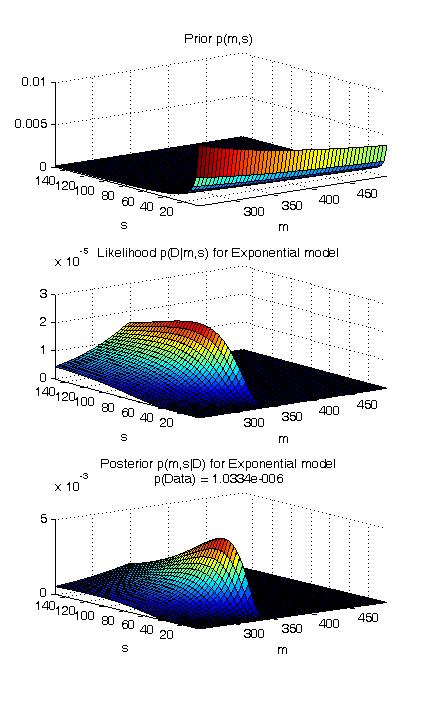Schedule of topics:
The order of topics is listed below. The exact dates for each topic will be established en route. Check this page frequently for updates.- Introduction: Examples of modeling; the meta-structure of modeling.
- Representation and process in models.
- Four simple experiment-and-model exercises, on the web.
- General structure of modeling in the physical and cognitive sciences.
- The template-similarity model (from one of the exercises, above) placed in the modeling framework.
- Do dogs know calculus? A fetching example of modeling.
- Detailed example of modeling with MatLab.
- A full-scale example of a behavioral phenomenon and two models
that might account for it.
- Read Kruschke, J. K. (2001). The inverse base-rate effect is not explained by eliminative inference. Journal of Experimental Psychology: Learning, Memory, and Cognition, 27, 1385-1400.
- Understand the psychological ideas and their formal expressions in the two models. If you like, you can read the article that describes the EXIT model in detail (Kruschke, 2001, J. Math. Psych.).
- Understand the experiment procedure, the results, and the statistical analyses. (Hands-on details of experiments and statistics are saved for later.)
-
Parameter estimation: Finding parameter values that minimize discrepancy between data and model predictions.Homework Assignment:
Hill climbing in MATLAB.
Assigned Thursday January 27, 2005.
Due Thursday February 5, 2005.

- Mathematical analysis and closed form solution.
- Dense grid search.
- Simulated annealing.
- Hill climbing: Various algorithms.
-
Optional references:
- Ch. 7, pp.253-294 of Bishop, C. M. (1995). Neural networks for pattern recognition. New York: Oxford University Press.
- Ch. 5, pp.108-134 of Wickens, T. D. (1982). Models for behavior. San Francisco: Freeman.
- Ch. 10, pp. 394-455 of Press, W. H., Teukolsky, S. A., Vetterling, W. T., Flannery, B. P. (1992). Numerical recipes in C (2nd Ed.). Cambridge, UK: Cambridge U. Press.
-
RMSD as a measure of discrepancy between data and model predictions.Homework Assignment:
Maximal likelihood
and Bayesian model comparison.
Assigned Tuesday Feb 8, 2005.
Due Tuesday Feb 22, 2005.
- Basic concepts of statistical testing of model fit. (Power point presentation regarding model rejection.)
- Maximal likelihood as a measure of model fit.
- Bayesian approach to parameter estimation and model selection.
- Pitt, M. A. and Myung, I. J. (2002). When a good fit can be bad. Trends in Cog. Sci., 6, 421-425.
- Myung, I. J. and Pitt, M. A. (1997). Applying Occam's razor in modeling cognition: A Bayesian approach. Psychonomic Bulletin and Review, 4, 79-95.
- Lee, M. D. (2004). A Bayesian analysis of retention functions. J. Math. Psych., 48, 310-321.
- Detailed example of conducting an experiment and analyzing data in MatLab.
- Read N. H. Anderson
(1965) regarding an averaging model of impression formation.
- (Cf. the earlier exercise regarding information integration.)
- Understand ethical treatment of participants.
- Belmont report regarding ethical principles.
- I.U. Human Subjects info. Our in-class experiments will not need approval by the human subjects committee, but this information is posted here so that you know it exists, in case you will be conducting your own research in the future.
- Program and run approximate replication of experiment in MatLab.
- Do this version that uses only the command
window of Matlab (no GUI).
- For a very simple example of a GUI, even simpler than anything in the Matlab examples, check out these: GuiExample.fig, GuiExample.m
- Here is an old version of the experiment (not to be used for generating class data) that uses a graphical user interface (GUI) in Matlab. You will need both the ".fig" file and the ".m" file: NHA65GUI3.fig, nha65gui3.m. It might not work anymore...
- Do this version that uses only the command
window of Matlab (no GUI).
- Do basic statistical analysis of results in MatLab.
- Kruschke, J. K. (2003). Statistical Methods: Overview. In: L. Nadel (Ed.), Encyclopedia of Cognitive Science. Nature Publishing Group/ Macmillan Publishers Ltd.
- Wickens, T. D. (1998). Drawing conclusions from data: statistical methods for coping with uncertainty. In: D. Scarborough and S. Sternberg (Eds.), An invitation to cognitive science, vol. 4: Methods, models and conceptual issues. Ch. 12, pp.585-634.
- Matlab program for collating the collected data.
- Matlab program for statistical analysis of the Anderson data.
- Fit averaging model to data.
- Individual projects:
- Follow this link for details and suggestions regarding individual projects.
- Each student selects a topic of personal interest, and proposes a simple experiment and simple model for programming in MatLab. Students are encouraged to base their proposals on existing published research. The experiment must be short enough that it can be completed by a participant in 15 minutes. The model must be simple enough that the student can clearly explain it to the class and be confident that it is accurately programmed in MatLab. The model should also have a clear interpretation in terms of cognitive processes; purely "descriptive" models do not qualify. The proposal must be approved by the instructor An example of all this is the N. H. Anderson work studied in the previous section of the course.
- Each student programs his/her experiment in MatLab, and other students are participants. Ethical treatment of participants will be emphasized.
- Each student conducts a statistical analysis of the effects of interest in his/her data.
- Each student programs the corresponding model, and fits the model to his/her data.
- Periodic progress reports are submitted and presented in class, and a final report. The final exam period will be devoted to a poster session in which students display their project.
| Homework Assignment: Four exercises, on the web. Assigned Tue Jan 11. Due Tue Jan 18. |
| Homework Assignment: Anderson (1965) Homework. Assigned Thu Mar 3, 2005. Due Thu Mar 10, 2005. |